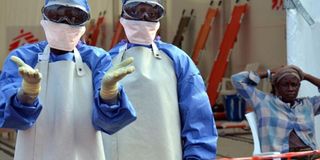UN volunteer to Sierra Leone leaves France after recovering from Ebola

Liberian health workers at Doctors Without Borders (MSF) Ebola treatment centre in Monrovia. Burial workers in the Sierra Leonean city of Kenema have dumped bodies in public in protest at non-payment of allowances for handling Ebola victims. PHOTO | ZOOM DOSSO |
What you need to know:
- The epidemic, which has hit Guinea, Liberia and Sierra Leone hardest, has left more than 5,400 people dead and infected more than 15,000, according to the World Health Organization.
- Recent data has shown a decline in cases in Liberia, the worst-hit country, and Guinea, but last week, 533 new cases were reported in Sierra Leone — the highest weekly tally since the epidemic began in that country.
PARIS
A UN employee flown to France for treatment after contracting Ebola in Sierra Leone has been cured and has left the country, the health ministry said.
The Unicef official, evacuated to France on November 1 and treated in a hospital on the outskirts of Paris, “is now cured”, a ministry statement said.
The person, whose nationality and gender were not disclosed, “left hospital this morning and has left France,” it added.
The official is the second person to recover in France after a French nurse, who worked for Doctors Without Borders (MSF) in Liberia, was successfully treated at the same military hospital in September.
The epidemic, which has hit Guinea, Liberia and Sierra Leone hardest, has left more than 5,400 people dead and infected more than 15,000, according to the World Health Organization.
VOLUNTEERS
Meanwhile in London, a first group of volunteers from Britain’s state National Health Service left for Sierra Leone on Saturday to join the Ebola epidemic fightback.
More than 30 NHS workers flew out of London Heathrow Airport and were due to arrive in the capital Freetown Sunday for a week of training before moving to British-built treatment centres around the west African country.
The group includes doctors, nurses, clinicians, psychiatrists and emergency medicine consultants.
“I found myself less and less able to hear about the evolving situation in west Africa and the increasing loss of life and do nothing.
I felt I just had to go,” said Doctor Hannah Ryan, 29, from the intensive care unit at Aintree University Hospital in Liverpool, northwest England.
Doctor James Lavers, 37, an intensive care registrar from Bangor in northwest Wales, said: “This could be the biggest medical disaster of my lifetime, killing hundreds of thousands of people in the region.
To prevent this from happening and save vast numbers of lives, large-scale intervention has to happen now.”
The volunteers have gone through nine days of intensive training at a specialist Ministry of Defence unit in northern England, which has a replica treatment centre.
DECLINING CASES
More than 1,000 NHS workers have put their names forward and more teams of British volunteers are due to go out to Sierra Leone over the coming weeks.
More than 5,000 people have died in the west African Ebola outbreak and more than 15,000 have been infected.
Recent data has shown a decline in cases in Liberia, the worst-hit country, and Guinea, but last week, 533 new cases were reported in Sierra Leone — the highest weekly tally since the epidemic began in that country.
“Our fight against Ebola in west Africa is one of Britain’s biggest responses to a disease outbreak,” said International Development Secretary Justine Greening.
“But to beat Ebola we desperately need the experience and dedication of skilled doctors and nurses to care for the thousands of sick and dying patients who are not receiving the treatment they need.”





